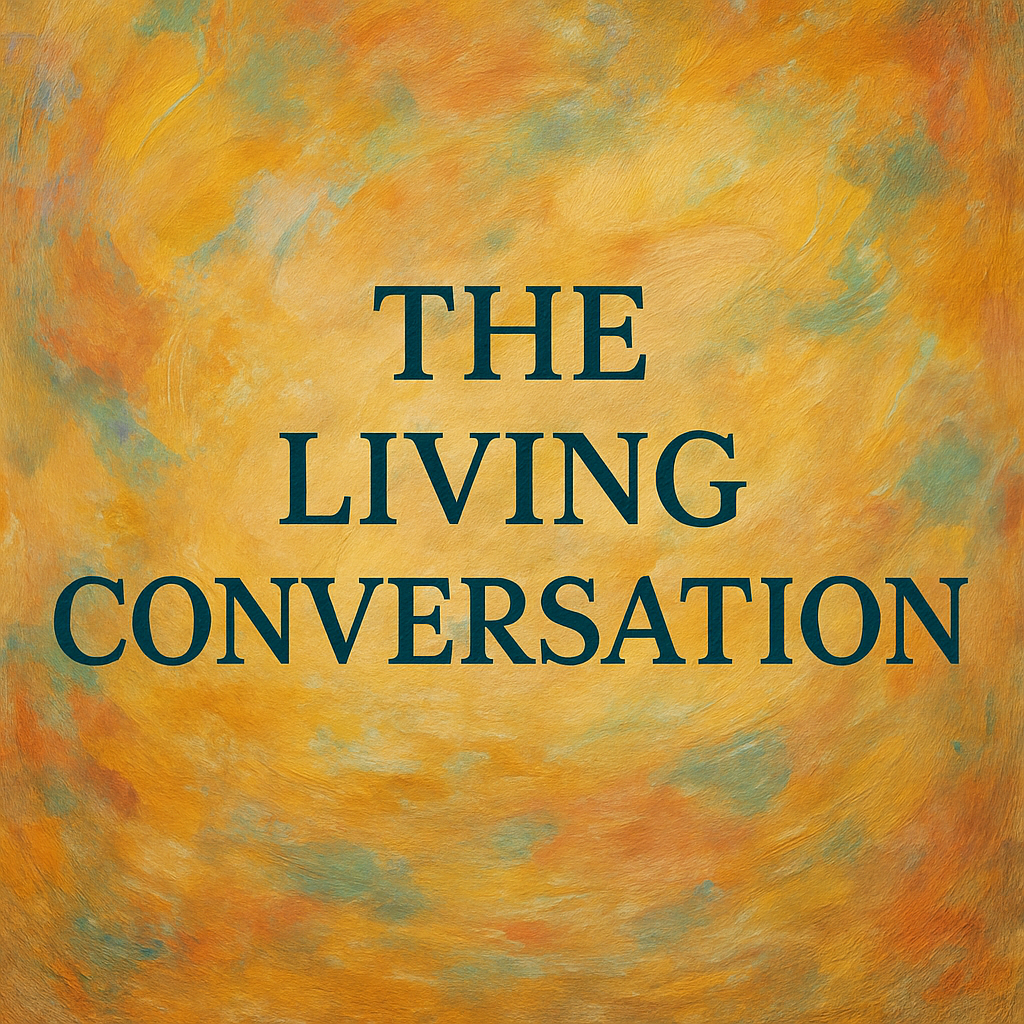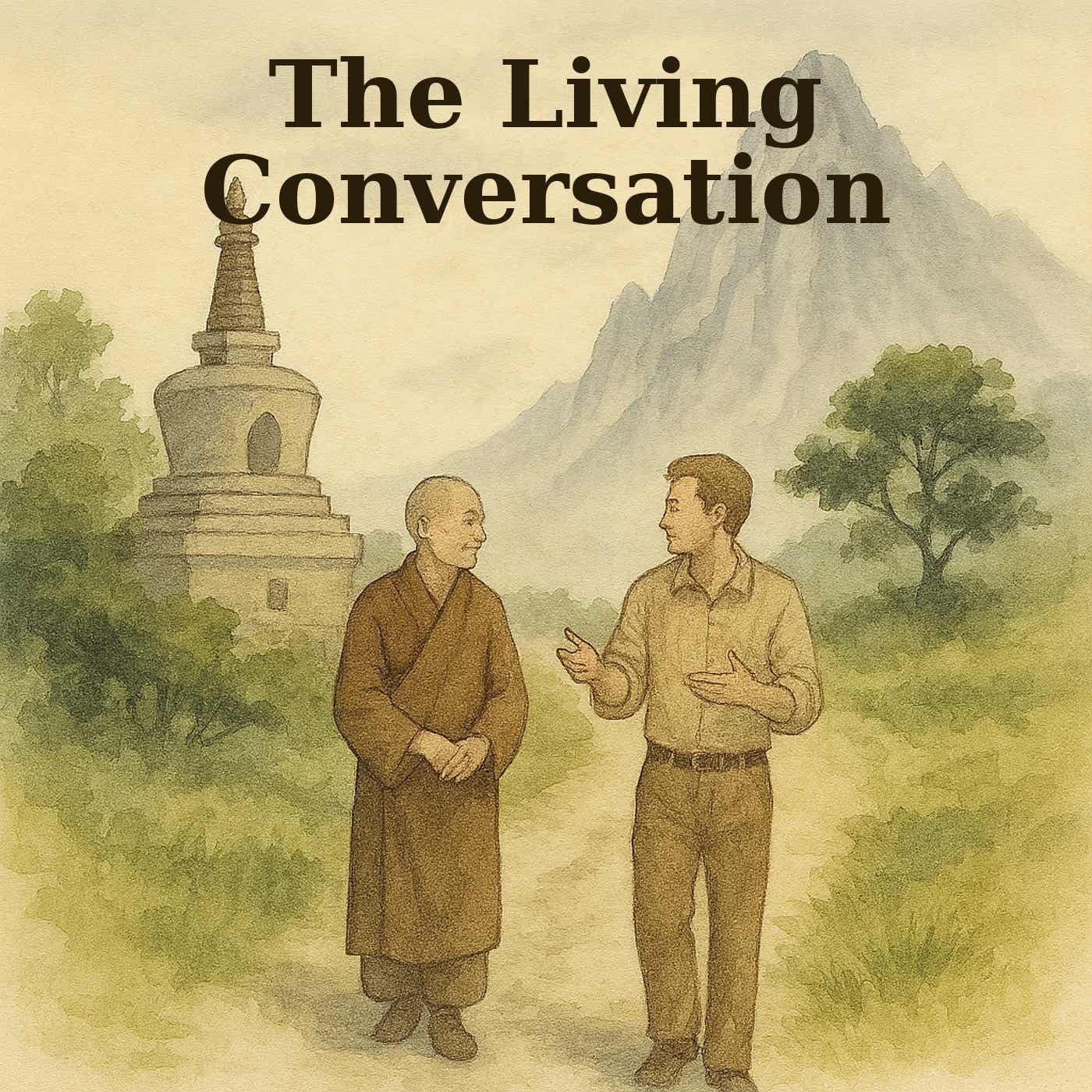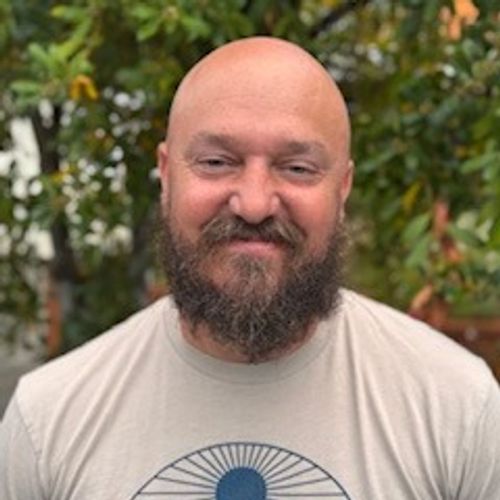Shamatha, Vipassana, and the American Dharma Experiment — with Nick Egan, PhD
In this episode, philosopher and leadership coach Nick Egan, PhD joins Adam Dietz and Anthony Wright to explore Buddhism, meditation, and what it means to practice wisdom in everyday life.
We dive into:
- Shamatha vs Vipassana — the two classic forms of Buddhist meditation.
- The American Dharma experiment — how U.S. practitioners engage Zen, Dzogchen, and Taoism in unique ways.
- The paradox of non-attachment and the trap of spiritual bypassing.
- The tetra lemma and Buddhist insights into emptiness.
- How ancient wisdom applies to business, leadership, and coaching today
⚠️ Note on audio: Due to technical issues, Nick’s and Adam’s voices are not as clear in this recording (Anthony’s audio came through clean). Thanks for your patience — the conversation is rich, and we’re working to ensure future episodes meet a higher sound quality.
📌 Connect with us:
- Adam Dietz → The Way Between on Substack
- Anthony Wright → theonaut.com
- Nick Egan → nickeganphd.com
Transcript
I'm Anthony Wright.
Speaker A:And I'm your co host with Adam Dees.
Speaker A:And our guest today is Nick Egan.
Speaker A:And Nick, before the break, you were talking about the structure of meditation, and you had met a Tibetan scholar named Bia Alan Wallace, and you were talking about getting locked into a meditative state.
Speaker A:Would you speak about that again, please?
Speaker B:Yes.
Speaker B:So the idea with.
Speaker B:So in Buddha.
Speaker B:I can pull back up just a tad bit and give a bit of context, please.
Speaker B:In Buddhist practice in particular, there are two broad categories of meditation.
Speaker B:One is called shamatha, which means calm abiding.
Speaker B:The other one is called vipassana, which means like, insight.
Speaker B:And so within what 99% of what most people think of as meditation is in this shamatha type box, and how you classify that or categorize it is there's an object of awareness.
Speaker B:The object can be anything at all.
Speaker B:Right.
Speaker B:It could be visualized.
Speaker B:It could be something you see, it could be a thought, whatever you want.
Speaker B:And then the idea is that your awareness is stabilized in relationship with the object of awareness.
Speaker B:Most people's awareness is jumping all around.
Speaker B:You probably heard the term monkey mind, right?
Speaker B:It's like monkey mind jumping all around.
Speaker B:Shamatha is the opposite of that, which is like a stabilized mind.
Speaker B:And with that, then a state will arise that we call samadhi, which just means like an absorption state.
Speaker B:Okay.
Speaker A:And then you were speaking about vipassana.
Speaker B:Vipassana is in a.
Speaker B:In a Mahayana sense, in the sense of the Buddhism that I practice.
Speaker B:It means a clear insight.
Speaker B:And that insight is into either emptiness or the nature of mind or dependent origination, which are all words for the same thing.
Speaker A:Yep.
Speaker B:Yep.
Speaker A:So do you guide people with that sort of understanding, from yourself into their own unfolding of where they're saying they'd want to go?
Speaker B:I. I typically don't, with some rare exceptions, just because I do have.
Speaker B:I am authorized to teach to some degree, but I find there are many, many great teachers out there.
Speaker B:Like, you don't need an amateur.
Speaker B:Like, go to the.
Speaker B:Go to a professional.
Speaker A:Well, but I mean, people have accepted you as a.
Speaker A:As a coach, so.
Speaker A:But with your understanding, you have some idea about how to steward their conscious journey, wouldn't you say?
Speaker B:Yeah.
Speaker B:With coaching, where this comes into play with coaching is.
Speaker B:Well, let's talk about mindset coaching for a second.
Speaker C:Okay.
Speaker B:All mindset coaching is in hypnosis and all of that stuff.
Speaker B:It's recognizing a pattern.
Speaker B:Yes.
Speaker B:Being aware of the pattern.
Speaker B:And then when that pattern is.
Speaker B:When you're aware of it, you're either choosing intentionally to disrupt it or to not, right?
Speaker B:And then, and then you're reflecting on it.
Speaker B:That's all.
Speaker B:All of coaching, all of that stuff is the same path.
Speaker B:So the benefit of shamasa or meditation or understanding the mind at maybe a deeper level than you would otherwise is you're able to then help people stabilize an understanding of what the pattern is before you disrupt it.
Speaker B:Because most of the time we're walking around thinking like doing stuff, right?
Speaker B:I don't know really why I did stuff or I think I like this stuff, I don't like this other stuff.
Speaker B:But really what's happening is you're operating from these patterns that are informing your behaviors and those behaviors are creating results.
Speaker B:And if you want different results, you have to work the behaviors.
Speaker B:To work the behaviors, you have to change the pattern.
Speaker A:That's really well said.
Speaker A:So Adam, what do you think?
Speaker A:What do you think is a super.
Speaker C:Well, I try not to, but.
Speaker B:I.
Speaker C:Had a couple thoughts.
Speaker C:One maybe a little too esoteric, we can get into it later.
Speaker C:But basically the main thought is I've been kind of contemplating on this.
Speaker C:Basically I would just want to call it like West Coast Zen.
Speaker C:I feel like the three of us almost come from this lineage in a lot of ways where we were hippie adjacent or in Anthony's case, actual hippie, and we found ourselves looking at stuff like Alan Watts or whatnot and we really gravitating towards Buddhism.
Speaker C:And I know you have a really broad understanding of Buddhism, you have a broad cultural type of context to look at this in.
Speaker C:What are your thoughts about American Buddhism as a unique route, a unique path and how it is similar and different than other traditions you're familiar with?
Speaker B:Man, that's such a good question.
Speaker B:I would even add like, I like, I don't think I've heard you call it, you know, West Coast Zen, but I understand that as like a framework.
Speaker B:And, and so some of the commonalities, what I've seen among Americans is that they're very much into what in Tibetan traditions we call like the Sahajagana, meaning like the effortless vehicle or like the original, the, the self arising vehicle, like the non dual aspect.
Speaker B:So that's why people are drawn to like Zen, they're drawn to philosophic Taoism, they're drawn to Zogchen, the drawn to Mahamudra because it's like it gets right to the heart of it.
Speaker B:And as Americans especially like we have had a lot of academic training so we're able to understand that we can pick up a book and kind of understand that it's pointing in some direction.
Speaker B:And so Americans, I think, are uniquely interested in what traditionally have been the highest teachings, right?
Speaker B:Like Dzogchen, Mahamudram, Zen, those are all like at the highest level within their own framework.
Speaker B:And so I think that that informs what Americans actually want.
Speaker B:And then where I think we sometimes fall down, I think we're still getting to it is like there are steps to get.
Speaker B:Like if you can't, if you don't get the nature of mind instantaneously, then you know better.
Speaker B:Like next time you gotta go through the actual path, right?
Speaker B:And the path takes months, years, decades, lifetimes.
Speaker B:And so that's where Americans, I think are like, well, I kind of wanted that juice like right away.
Speaker B:Maybe I'll go to the next person and he'll be able to give it to me and maybe he can, right?
Speaker B:So when I hear American Buddhism, I'm actually very encouraged because I know many Americans that are following paths very strictly and are seeing the results of it.
Speaker C:Okay, I have a follow up question to that.
Speaker C:Because growing up in Western culture, consumerist culture, we are embedded, imbued with certain types of values and almost like a certain type of, type of karma.
Speaker C:And I feel like personally I've had a journey of embracing that, coming to terms with it.
Speaker C:You know, I think when people start on this type of path, sometimes they feel very disciplined, they want to stay above the fray.
Speaker C:They feel like they want to shun their, their past, so to speak.
Speaker C:That's part of where I'm coming from with this angle of American Buddhism where we can't necessarily leave it all behind.
Speaker C:We have some karma and we have to be gentle with ourselves and embrace that and see ourselves at a higher level, but not just throw the baby out with the bathwater type of thing.
Speaker C:What are your thoughts on that?
Speaker B:I think that what's coming to mind is there's a mentality with many people, many Westerners that get into these spiritual paths and they have this sort of like extreme non attachment.
Speaker B:They're like, I'm going to be the most non attached practitioner ever, right?
Speaker B:And they're like, I'm going to.
Speaker B:The way I'm going to be non attached is like, I'm going to be living very simply and living in the forest and I'm going to be non attached.
Speaker B:I'm going to be so non attached.
Speaker B:I'm just going to try really hard.
Speaker A:They're attached to being non attached.
Speaker B:Yeah, exactly.
Speaker B:You create this attachment to non Attachment, but it's quite insidious because it reifies the ego in a way that is very difficult to take out.
Speaker B:John.
Speaker A:Well, we talked about this as spiritual bypassing.
Speaker B:Yeah, Shankar talked about it spiritual bypassing.
Speaker B:Nagarjuna and I think Chandrakirti, Indian philosophers, they talked about it as like, look, if you think emptiness is real, you're almost unstable.
Speaker B:So it's, I think that anytime you are engaged, engaged in the so called battle with the ego, you actually are just giving power to the ego.
Speaker B:And that to me that makes it seem I.
Speaker B:That's a clear tell that you're a neophyte when it comes to actual practice.
Speaker C:When you said, when you said if you think emptiness is real, you're in trouble type of thing, that was like, wow, that was really mind blowing, you know, because we can get into, we can get into the being and non being and we to get too esoteric, but it's, it's both real and non real at the same time.
Speaker C:Right.
Speaker C:And, and we can't.
Speaker C:We, we cannot cling to it.
Speaker C:We cannot cling to anything.
Speaker C:Is that, is that your understanding?
Speaker C:If we start to clean this up, Lost it.
Speaker B:Yes.
Speaker B:And it, and I would even go like there's something called the tetra lemma.
Speaker B:I don't know if you remember that from like Mar.
Speaker B:So the tetra tetra four lemma problem with four problems.
Speaker B:And it's things.
Speaker B:But neither emptiness neither exists or things neither exists nor non exists.
Speaker B:Both exist and non exist, or neither exists or non exist.
Speaker B:So all those categories are like void.
Speaker B:Right.
Speaker B:Or are nil.
Speaker B:And so those are all just ways of thinking that you can understand the beingness of the world in some kind of like philosophical way.
Speaker B:When in reality what it's pointing to is like you need to be deeply letting go of the appearance of the.
Speaker A:World and even the thinking, you know?
Speaker B:Sure.
Speaker C:And this was another thing that came up for me as well, is other cultures have been here before.
Speaker C:You just said so concisely.
Speaker C:Exactly what we're trying to articulate.
Speaker C:And people have discovered this thousands of years ago, hundreds of years ago.
Speaker C:I do want to tip my hat to Carl Jung in opening the door for all of us to, to explore different cultures and value them in this way.
Speaker A:So how do you bring this into business?
Speaker B:Well, it's interesting, like this concept in particular, like non attachment, I consider it much more.
Speaker B:See, I'll let you in on a tool of the trade or a secret of the trade.
Speaker B:Oh boy.
Speaker B:Like business and coaching.
Speaker B:Yeah.
Speaker B:In philosophy we talk much more on the via negativa side, it's not this, it's not that, and that's hard for an untrained person to wrap their head around.
Speaker B:So, like in coaching and in business, you have to sort of talk about the via positiva.
Speaker B:So it's less about like, hey, let go of everything, and much more about, like, hey, dance in the moment, right?
Speaker B:Oh, yeah, let's be open to possibilities or let's be nimble or let's think about systems and interconnection and that kind of thing.
Speaker B:So you point more toward that and you get a similar kind of result structurally.
Speaker B:But it doesn't really, like, it doesn't help the individual too much, I don't think maybe it does.
Speaker B:You know, they're two, two separate things.
Speaker B:I don't think anybody's ever going to get enlightened through the path of only business.
Speaker B:You also have to.
Speaker A:Well, right, but I mean, that's partly what people come to you for and they're.
Speaker A:Well, let's use a, A trigger word.
Speaker A:They're invested and perhaps attached and they've got to go to work.
Speaker A:I mean, that's.
Speaker A:So that's an interesting idea about how you hold the space for them to find that what they.
Speaker A:And does this make sense to find what they already knew?
Speaker B:I think it makes perfect sense in one.
Speaker B:One of the things, a North Star image that I hold for myself is that I am only a mirror that reveals people's limitless possibilities.
Speaker A:Exactly.
Speaker A:Exactly.
Speaker A:That's really wonderful.
Speaker A:Well, we're on the verge of a break here and we can all three of us be mirrors of endless possibilities.
Speaker A:I'm Anthony Wright and you can contact me through my website, theonount.com t h e o n a u t.com and Adam.
Speaker C:Yeah, I'm Adam Dietz and most of my work is on the way Betweenubstack.com there's links to everything there and you can contact me@dietzadammail.com d I e t z adammail.
Speaker A:And Nick, how can people contact you?
Speaker B:You can contact me through direct message on LinkedIn or I'm available@nickeganphd.com or through my leadership company, which is shiftleadership.google.
Speaker A:And your last name is spelled E G A N. Yep.
Speaker C:Great.
Speaker A:All right, we're going to take a short break and be right back, so stay tuned.


